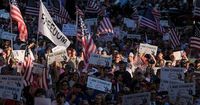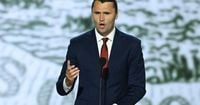On September 10, 2025, the American political landscape was jolted by the assassination of Charlie Kirk, a 31-year-old conservative activist and co-founder of Turning Point USA. Kirk was shot in the neck by Tyler Robinson while speaking at Utah Valley University in Orem, Utah—the first stop of his much-anticipated American comeback tour. The event, meant to spark debate and discussion, instead became the flashpoint for a nationwide reckoning on politics, faith, and the boundaries of free speech.
In the days that followed, reactions poured in from across the globe, revealing deep divisions not only within the United States but also among international observers. In Nigeria, the response was especially polarized. According to reporting by The Nation, prominent pastors and gospel singers such as Nathaniel Bassey and Victoria Orenze used their platforms to mourn Kirk and praise his courage. Bassey posted a simple yet heartfelt message: “Pained. Rest in the Lord, Charlie Kirk.” Orenze went further, calling Kirk a “true soldier of Christ” and urging Christians to see his death as a sign that “we are clearly in the last days.” Pastor Blessed Uzochikwa, husband of gospel artist Mercy Chinwo, echoed these sentiments, lauding Kirk as a man of “conviction, courage, and dignity who never wavered in his beliefs, regardless of opposition.”
Yet, not all Nigerians shared this reverence. Critics accused these Christian leaders of hypocrisy, questioning why they would publicly mourn an American figure known for divisive rhetoric while remaining silent on the ongoing violence and persecution facing Christians at home. Social media buzzed with pointed commentary. As X user Ourfaveonlinedoc remarked, “Many Nigerian pastors kept silent about the slaughter of Nigerian Christians by terrorists and religious extremists in the north, but somehow you found your Twitter login to post about Charlie Kirk.” Another user, Kelviiisss, was even more direct: “Watching Nigerian pastors send their condolences to Charlie Kirk’s family, but keep quiet when a lot of Nigerian Christians, children, women and men are killed every day in the hands of herdsmen is another level of insanity and hypocrisy.”
The controversy extended beyond Nigeria’s borders. In the United Kingdom, George Abaraonye, president-elect of the Oxford Union, drew condemnation after celebrating Kirk’s death on social media—a post he later deleted. Oxford Union officials quickly distanced themselves from his comments, reaffirming their opposition to political violence. Meanwhile, Nigerian-born writer Ikhide Ikheloa offered a more nuanced critique, describing Kirk as “the loudest product of white American privilege” and a “bigot” whose views on race and society were deeply harmful. Still, Ikheloa insisted, “Charlie Kirk did not deserve to die, despite his bigoted self. He was somebody and somebody’s child.”
Back in the United States, the reverberations were just as intense. While some, like late-night host Jimmy Kimmel, made light of the assassination—leading to his show’s indefinite suspension by ABC—many celebrities and social media influencers responded with an outpouring of sympathy and calls for unity. Jamie Lee Curtis, speaking on the “WTF” podcast, fought back tears as she reflected, “I disagreed with him on almost every point I ever heard him say, but I believe he was a man of faith. And I hope in that moment when he died that he felt connected to his faith.” Actor Chris Pratt encouraged his followers to seek solace and connection, while singer Justin Bieber wrote about a spiritual battle for the mind in a widely shared Instagram post. Social media influencer Jeffree Star condemned the shooting on a live stream and defended his stance on free speech, telling critics, “Because I’m standing up for someone that passed away, I’m now being called names in the chat. This is what’s wrong with a lot of you people. You will never get far in life. You are sick in the head.”
However, those who celebrated Kirk’s death or made inflammatory comments faced swift consequences. Charlie Rock, a communications staffer for the NFL’s Carolina Panthers, lost his job after posting, “Why are y’all sad? Your man said it was worth it.” An American Airlines pilot was also fired for a derogatory social media post about Kirk’s assassination. The fallout extended into academia, with at least two college students in Texas being dismissed for mocking Kirk’s death on social media. The Texas Education Agency reported investigating nearly 300 complaints about teachers making “vile” comments online regarding the killing.
Amid this maelstrom, Kirk’s supporters mobilized. On September 20, thousands gathered in Fort Worth, Texas, for a rally and march in his honor, organized by local conservative activists and North Texas GOP chapters. The crowd, spanning generations, wore shirts emblazoned with “Freedom”—a nod to the shirt Kirk wore on his final day—and MAGA hats, waving American flags as they marched from the JFK Memorial. Organizers like Paul Lemon and Carlos Turcios framed the event as a battle between good and evil, a time to “choose sides.” Turcios declared, “We are in a state of total war,” as the crowd chanted “USA,” “Jesus,” and “Charlie Kirk.”
The rally was not without its detractors. Some bystanders heckled the marchers, pointing to Kirk’s history of controversial remarks on race, religion, and the LGBTQ community. Jasper Cook, a recent transplant to Fort Worth, expressed dismay at the idolization of Kirk, noting, “A lot of propaganda’s kind of got them to idolize someone who really said very hateful things about the communities that are here.” Mary Kelly, 77, drew parallels to the assassination of Democratic lawmaker Melissa Hortman, pointing out the disparity in public mourning and recognition.
For others, the march was a source of comfort and hope. Nicole Kautz, speaking to The Dallas Morning News, said that knowing people were coming to faith or drawing closer to God because of Kirk’s example gave her solace. “I’m trying to just trust that God has a reason for everything,” she said. Jazmine Coleman, who brought her children and displayed paintings of Kirk, emphasized the need for dialogue over division, lamenting, “It feels like Americans are more divided than ever, and social media is a big part of that.”
The national mourning culminated in a memorial service at State Farm Stadium in Glendale, Arizona, on September 21. Tens of thousands gathered in person, with thousands more expected to stream the event online. The memorial featured speeches from President Donald Trump, Vice President JD Vance, Secretary of War Pete Hegseth, and Kirk’s widow, Erika Kirk. Christian worship artists Chris Tomlin, Brandon Lake, Phil Wickham, Kari Jobe Carnes, and Cody Carnes led the crowd in song, underscoring the event’s spiritual undertones.
Charlie Kirk’s assassination has exposed deep rifts in both American and global society, forcing a reckoning with questions of violence, faith, and the limits of public discourse. As the nation mourns—and debates—his legacy, the challenge of moving forward remains as pressing as ever.



